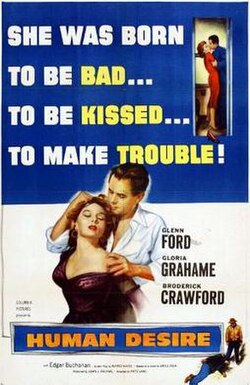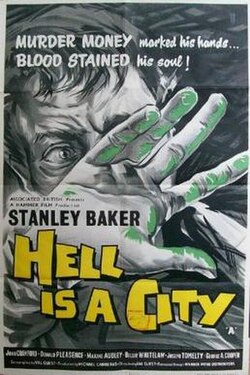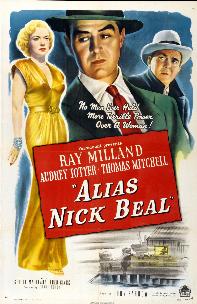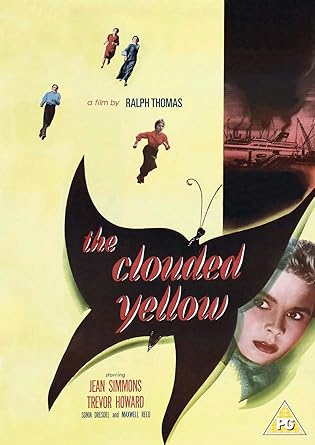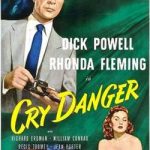
Film Noir Flashback/Cry Danger
December 15, 2024
Film Noir Flashback/Murder, My Sweet
December 20, 2024I post reviews (Film Noir Flashback) of movies from, and inspired by, Hollywood’s Golden Age of Noir, the 1940s and 1950s. I am a film noir enthusiast. Maybe, like me, you are looking to enjoy films that are different, or of a different era. Films you may not have seen, ones encompassing cynical detectives, seductive femme fatales, flawed sidekicks all tossed together into intricate plots. (Not forgetting the snappy dialogue too).
Backstory: Film Noir has its roots in German expressionist cinematography and American crime fiction. During the 1930s Hollywood became a perfect storm of film artists fleeing the threat of Nazi Germany, emigrating to America, and specifically to the Film studios of Hollywood. This included great directors such as Fritz Lang, Jaques Tourneur, Michael Curtiz and Robert Siodmak.
This new dramatic visual style combined with American hardboiled crime stories (noir fiction), emerged during the Great Depression and produced many classic noirs. Some of these writers include: Raymond Chandler, James M. Cain, Dashiell Hammett, Patricia Highsmith, Jim Thompson and Mickey Spillane.
I hope to showcase some of these memorable noir movies here for you. And advance apologies for a mixture of British and US English occasionally. I have applied the link below, to the Amazon.com DVD of today’s featured film.
Inspired by hardboiled detective stories and film noir, I have written a, Sterling Private Investigator Series, set in present-day London. I have also posted a link to my books at the bottom of the page. For more Film Noir Flashback movie reviews: https://johnkempauthor.com/blog-film-noir-reviews/
Today’s Film Noir Flashback is:
Human Desire
USA Link: Blu-ray DVD: https://amzn.to/4fns1Lx DVD: https://amzn.to/3Dem0n1
UK Link: Blu-ray DVD: https://amzn.to/4gXFviy DVD: https://amzn.to/41ZRI1X
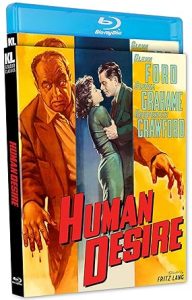
“It’s all wrong, Vicki. The whole thing’s been wrong from the beginning…and I feel dirty.”
Film Studio: Columbia Pictures 1954/B&W
Director: Fritz Lang
Original Music: Daniel Amfitheatrof
Cinematography: Burnett Guffey
Film Editor: Aaron Stell
Written by: Alfred Hayes (screenplay), Emile Zola (novel)
Produced by: Lewis J. Rachmil
Main Actors: Glenn Ford, Gloria Grahame, Broderick Crawford
Run time: 91 minutes
Preview
A 1954 redo (and loosely based), of Jean Renoir’s, La Bette Humaine (The Human Beast). This “train noir” was inspired by the 1890 novel, (of the same name), written by Emile Zola. Apparently, the director, Fritz Lang was unimpressed with the title, and thought it was redundant, wondering, “what other kind of desire is there…”
The film is toned down significantly from the book due to the Production Code at the time, (also known as the Hays Code), which existed from 1934 until 1968. A challenging list of dos and don’ts for directors and studios regarding sexuality and violence. They were working under severe restrictions.
Here is a link if you want to read more information on the Hays Code: https://en.wikipedia.org/wiki/Hays_Code
Fritz Lang reunited Gloria Grahame and Glenn Ford here, after they both starred in his 1953 film: The Big Heat. Gloria Grahame played Violet in, the 1946 movie, It’s a wonderful Life. Glenn Ford starred opposite Rita Hayworth in the 1946 movie, Gilda.
In Human Desire, we join Jeff Warren (Glenn Ford), a Korean war veteran on his first day back as a railway engineer. The movie begins with him shunting a train engine into a roundhouse. As he crosses the yard, we are introduced to Carl Buckley (Broderick Crawford), who has been promoted to Assistant Yard Master in Warren’s absence. Later, we meet Carl’s attractive younger wife, Vicki (excellently played by Gloria Grahame).
As you delve into this raw slice of life, you might wonder who is the most troubled: Carl Buckley, an alcohol addict, Vicki, who is physically abused by her husband and was sexually abused by an ex-boss, or the returning veteran, Jeff Warren, fresh back from the horrors of war. You wouldn’t hire any of these characters to cheerlead or host a party, that’s for sure, but this is noir. And a really good one at that.
Synopsis:
After the war, Jeff Warren, a quiet, unassuming man, returns to his railroad engineer’s job; he boards at the home of co-worker and his family. Their daughter, Ellen (played by Kathleen Case), is obviously in love with him. He’s even given her a present; a Kimono from Japan. You just know Jean is going to be disappointed, however; you suspect she’s almost too nice and too normal for him. Warren says he wants a normal life after the war but perhaps it is excitement he craves. Enter the alluring Viki Buckley to provide that…
Vicki is a bored housewife and married to Carl Buckley. A volatile man, who not only has a short fuse, but a penchant for mouthing off, which gets him fired. Carl asks his wife to petition John Owens (a businessman with connections… to whom she knows through a past employment), to give Carl his job back.
They travel to the city and Vicki goes cap in hand to Owens’ office, while Carl sits and stews, at a friend’s home, waiting for her delayed return. She succeeds, but Carl grows suspicious about what has transpired. The unspoken suggestion is that Vicki has slept with Owens. Raging with jealousy and perpetrating violence against her, he forces his wife to write an invitation for a liaison with Owens, onboard the train he is taking to Chicago.
They both join the same train and later, Carl kills Owens, removing Vicki’s incriminating letter back from the dead man’s pocket. Money is taken too, to make it look like a robbery.
Jeff Warren is in the wrong place at the wrong time: 12.30 – 1.00 a.m. While “deadheading” a trip home, and smoking in the vestibule of car 843, he encounters Vicki directly after the sordid stabbing. In efforts to distract him and help Carl make his escape, Vicki lures him further along the train, reaching an empty compartment, where they exchange small talk, flirt, and then exchange a passionate kiss. This is where that “desire” bit first comes in.
Upon arrival, Jeff sees Vicki on the platform at Carl’s side, and after being introduced, he realises (for the first time), they are husband and wife.
Jeff’s recent amorous encounter with Vicki clouds his judgement. When he attends the murder trial of John Owens, he stays silent regarding witnessing Vicki Buckley coming from the rear of the train — car 842, and the location of Owens’ compartment.
Later, when Jeff confronts Vicki about this, she lies about the murder, saying Owens was already dead, but later, she reneges and says she was forced into helping (with the murder), or she would have been killed.
Jeff begins a clandestine affair with Vicki, who is keen to escape her tempestuous marital relationship. Their marriage is toxic. Heavy drinking has cost Carl his job again too, and Vicki tells Jeff that Carl is selling the house and they are moving. Pertinently, Carl retains Vicki’s note (to Owens), and uses it as a form of blackmail, in attempts to bind her to him. Vicki’s attempts to find and destroy the note are repeatedly unsuccessful… but the next best thing is to convince Warren to murder her husband and destroy the letter so they can be together… What can go wrong?
Things to like:
A social snapshot of the lives of working-class Americans in the gritty and grey world of the railroad in the 1950s.
The claustrophobic action with the in-train sequences that amplify the drama (and who doesn’t love a train movie).
Grahame and Ford reunited after the stone-cold classic noir, The Big Heat.
Great cinematography: the arcing overhead shots of the yard and Warren stalking Buckley at night with murderous intentions.
The landscapes of the urban railway yards, the converging lines of the railway tracks, the depots and hubs, and the smoky vistas seen from the driver’s (engine cab), viewpoint. The photography is visually striking and creates an atmospheric backdrop to the squalid goings-on.
Broderick Crawford plays the heavy authoritative types. Here, he plays the older husband married to a bewitching wife. He is a bully and boorish, someone who sometimes relents (with regret), but is soon returning to type. He is always watchable.
Quotes:
Vicki: “You’ve killed before!”
Jeff: “Before? Oh, the war, huh. I’d almost forgot. You thought I could do it because of that, huh? Well, there’s a difference. In the war you fire into the darkness… something moving on a ridge, a position, a uniform, an enemy. But a man coming home helpless, drunk… that takes a different kind of killing.”
Vicki: “Yes, and a different kind of a man.”
***
Jeff: “I’ll leave the door open just, in case.”
Viki: “In case, what?”
Jeff: “In case one of us gets nervous.”
Vicki: “Do I look nervous?”
Jeff: “Yeah, just A little bit. It’s alright though, it’s very becoming.”
Vicki: “I had a headache, couldn’t sleep.”
Jeff: “There’s more to life than sleeping.”
***
Carl Buckley (anxiously waiting for his wife to return): “It’s six-thirty already.”
Jean: “If you’re married, that’s late, and if you’re single, it’s early.”
***
Jean (dressing for a date): “Zip me up will you, Carl.”
Carl (annoyed): “You dames, you spend more time gettin’ dressed…”
Jean: “Have too! It’s much better to have good looks than brains because most of the men I know can see better than they can think.”
***
Jeff: “How do you tell the right girl for you from the wrong one?”
Ellen: “By the way you love her.”
Must-see scene:
Carl Buckley has just murdered John Owens in a fit of jealousy; his wife, Vicki is present, and forced into colluding. They nervously exit the passenger compartment, avoiding the conductor. Carl, freezes when he spots Jeff Warren in the next car further along. They are effectively trapped in the corridor outside compartment F, where Owens body lays. To escape, they must move along the train and beyond Warren.
Carl orders his wife to distract Warren in order to achieve their flight (he is covered in blood). When Vicki approaches him, she asks where the club car is, in the pretence of wanting a drink. Warren asks to come along and they side-track to an empty compartment where he plants a hot-blooded kiss upon her lips. You might suspect there will be consequences for that kiss. And you’d be right.
The kiss and his acquaintance with Vicki are the start of a downward trajectory of events which will eventually lead him to perjury, adultery, and a planned murder.
Trivia
Courtesy of Wikipedia:
This film was largely shot in the vicinity of El Reno, Oklahoma. It used the facilities of what was at the time the Rock Island Railroad (now Union Pacific), though some of the moving background shots show well known East Coast railroad locations such as the Pulaski Skyway, the Lower Trenton Bridge (“Trenton Makes — The World Takes”) over the Delaware River and Harpers Ferry, West Virginia.
The production utilizes other stock railroad footage. A major number of scenes take place around CRI&P Alco FA unit No. 153 painted as the fictitious Central National; however, the interiors were filmed using a Hollywood mock-up of an EMD – F unit, according to the Obscure Train Movies website
Summary:
This film is the second collaboration between Gloria Grahame and Glenn Ford and I believe, the only two they star together. Both were directed by Fritz Lang. The other being: The Big Heat. Is there a better (noir) pairing? Whatever you think, I would recommend you see both films if you can.
In this role, Gloria Grahame transitions her portrayal of (a sort of), forlorn and sad vulnerability, to scenes and displays of calculation and manipulation. We learn she has suffered abuse from men and so, we remain sympathetic to her character in that regard. Whether her experiences are exaggerated or not, we suspect she is “playing” Warren when realising, she is losing him. And she is not shy of using her wiles and those powers of manipulation either. And possibly a lie or two.
The femme fatale characterisation here is ambiguous but what is surer: this film, and Gloria Grahame’s performance In a Lonely Place (alongside Humphrey Bogart), are her very finest.
Glenn Ford’s character is muddy too. On the exterior he seems happy to have returned home, easy-going, but we sense something is broken because he sticks his neck out and lies for this stranger. Yes, he is initially attracted to Vicki, (and seemingly hypnotized by her too), and in the cold light of a court case, he is willing to lose everything. Has his experience in the war clouded his judgement? The needle on his moral compass got stuck. Morality is less black and white.
Yes, Human Desire is somewhat bleak and lacking in optimism, particularly as it implies scenes of domestic violence, and if you’re looking for sunshine and roses, you won’t find it here. A cynical noir with cynical characters, all set against the backdrop of the American railroad; gritty and slightly gloomy maybe, but also great.
For more Film Noir Flashback movie reviews: https://johnkempauthor.com/blog-film-noir-reviews/
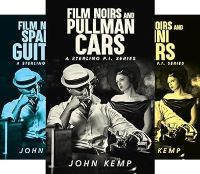
USA Link: Film Noirs & Spanish Guitars (paperback): https://amzn.to/4eYIFkA(eBook): https://amzn.to/3ZEy6ig
UK Link: Film Noirs & Spanish Guitars (paperback): https://amzn.to/4fBQflp (eBook): https://amzn.to/3ZVCisL
****

TMY Mini Projector, Upgraded Bluetooth Projector with Screen, 1080P Full HD Portable Projector, Movie Projector Compatible with TV Stick Smartphone/HDMI/USB, indoor & outdoor use
#AD USA Link: https://amzn.to/3ZxVoFf
#AD UK Link: https://amzn.to/49WEbdo

